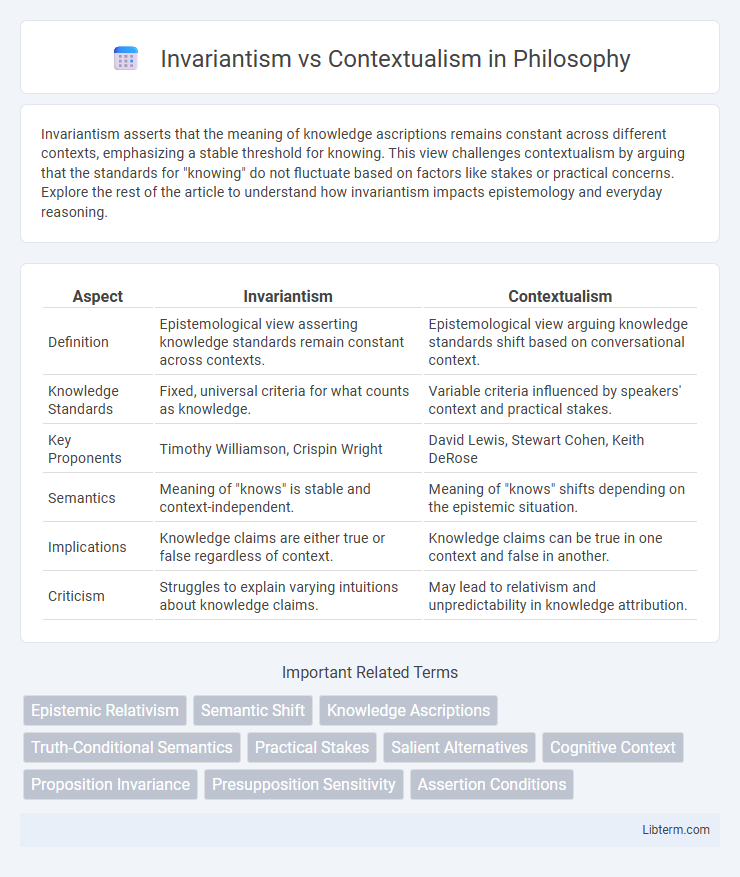Invariantism asserts that the meaning of knowledge ascriptions remains constant across different contexts, emphasizing a stable threshold for knowing. This view challenges contextualism by arguing that the standards for "knowing" do not fluctuate based on factors like stakes or practical concerns. Explore the rest of the article to understand how invariantism impacts epistemology and everyday reasoning.
Table of Comparison
| Aspect | Invariantism | Contextualism |
|---|---|---|
| Definition | Epistemological view asserting knowledge standards remain constant across contexts. | Epistemological view arguing knowledge standards shift based on conversational context. |
| Knowledge Standards | Fixed, universal criteria for what counts as knowledge. | Variable criteria influenced by speakers' context and practical stakes. |
| Key Proponents | Timothy Williamson, Crispin Wright | David Lewis, Stewart Cohen, Keith DeRose |
| Semantics | Meaning of "knows" is stable and context-independent. | Meaning of "knows" shifts depending on the epistemic situation. |
| Implications | Knowledge claims are either true or false regardless of context. | Knowledge claims can be true in one context and false in another. |
| Criticism | Struggles to explain varying intuitions about knowledge claims. | May lead to relativism and unpredictability in knowledge attribution. |
Introduction to Invariantism and Contextualism
Invariantism asserts that the truth conditions of knowledge attributions remain constant across different contexts, maintaining stable standards for what counts as knowledge. Contextualism argues that these truth conditions shift depending on the speaker's context, adjusting knowledge standards according to varying conversational parameters. Key figures in invariantism include Alvin Goldman and Timothy Williamson, while contextualism is championed by Keith DeRose and David Lewis.
Defining Invariantism: Core Principles
Invariantism asserts that the truth-conditions of knowledge attributions remain constant across different contexts, maintaining a single, unchanging standard for knowledge. Core principles include the idea that knowledge does not vary with the speaker's context or stakes involved, ensuring stable criteria for knowledge claims. This philosophical position contrasts with contextualism, which holds that knowledge standards shift depending on contextual factors.
Contextualism Explained: Key Concepts
Contextualism explains the variability of knowledge claims by emphasizing the role of context in determining the truth conditions of "knows" statements. It posits that what counts as knowledge can shift based on factors like the stakes involved, the speaker's intentions, or the conversational environment. This approach contrasts with Invariantism by rejecting fixed truth conditions for knowledge, instead highlighting how linguistic and situational contexts shape epistemic evaluations.
Historical Development of the Debate
The historical development of the debate between Invariantism and Contextualism in epistemology traces back to the late 20th century as philosophers sought to reconcile traditional epistemic norms with the variability of knowledge attributions across different contexts. Early contributions by Keith DeRose and David Lewis highlighted how knowledge claims' truth conditions shift depending on conversational contexts, challenging the Invariantist view that standards for knowledge remain constant. This debate evolved through critical responses, such as Crispin Wright's defense of Invariantism, deepening the discussion on the semantics of knowledge and its practical implications within linguistic and philosophical frameworks.
Major Philosophical Arguments for Invariantism
Invariantism asserts that the truth-conditions of knowledge claims remain constant across different contexts, emphasizing a stable standard for "knowing." Major philosophical arguments for invariantism highlight that the variability in knowledge ascriptions undermines objective truth and rational discourse. Proponents argue that recognizing knowledge as context-invariant preserves logical consistency and prevents skepticism driven by shifting conversational backgrounds.
Central Critiques of Invariantism
Central critiques of invariantism target its claim that the epistemic standards for knowledge remain constant across all contexts, arguing this rigidity fails to accommodate everyday variations in knowledge attribution. Critics highlight instances where shifting stakes or conversational backgrounds influence what counts as "knowing," challenging invariantism's inability to explain these context-dependent intuitions. This inflexibility contrasts with contextualism, which better captures how knowledge claims fluctuate based on differing epistemic standards.
Main Arguments Supporting Contextualism
Contextualism argues that the truth conditions of knowledge claims vary depending on the context, emphasizing that standards for "knowing" shift based on factors like stakes, intentions, and conversational surroundings. It posits that this flexibility accounts for ordinary language practices where "knows" can express different epistemic standards without contradiction. Prominent supporters, such as Stewart Cohen and David Kaplan, highlight how context-sensitive semantics resolves traditional epistemic puzzles like the interest-relative invariantism problem and epistemic paradoxes.
Evaluating the Weaknesses of Contextualism
Contextualism faces challenges in maintaining consistent criteria for truth across varying contexts, which can lead to relativism and undermine objective knowledge claims. Its reliance on shifting contextual factors complicates the ability to establish stable semantic standards, resulting in potential misunderstandings and communication breakdowns. Critics argue that this variability weakens the notion of absolute truth, making it difficult to evaluate statements uniformly across different discourse settings.
Practical Implications in Epistemology
Invariantism maintains that the standards for knowledge remain constant across different contexts, emphasizing a stable framework for assessing epistemic claims. Contextualism argues that these standards shift depending on practical stakes and conversational settings, which influences how knowledge is attributed in everyday discourse. This theoretical divergence affects practical epistemology by shaping approaches to skepticism, legal judgments, and everyday decision-making under uncertainty.
Conclusion: Current Trends and Future Directions
Current trends in epistemology reveal a growing interest in integrating invariantist and contextualist perspectives to better account for knowledge attribution across diverse conversational contexts. Future directions emphasize developing hybrid models that preserve invariant standards of knowledge while incorporating context-sensitive factors influencing epistemic judgments. This approach aims to reconcile theoretical debates and enhance practical applications in fields such as law, artificial intelligence, and everyday reasoning.
Invariantism Infographic

 libterm.com
libterm.com